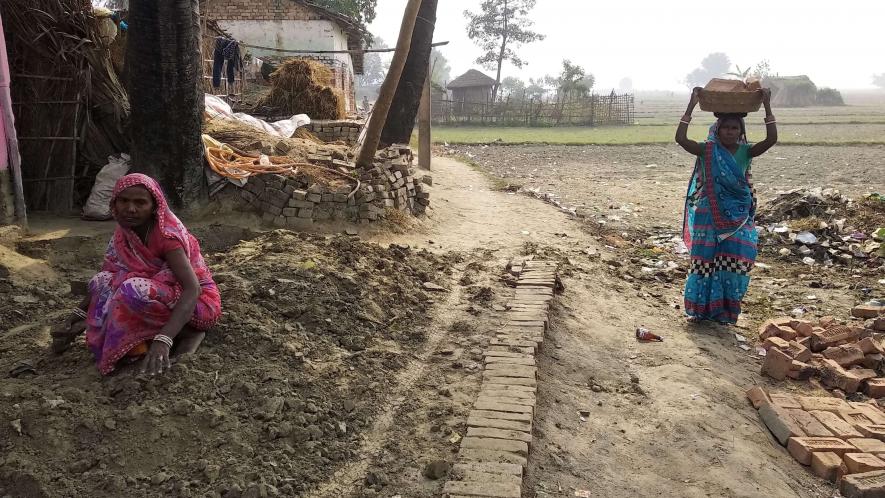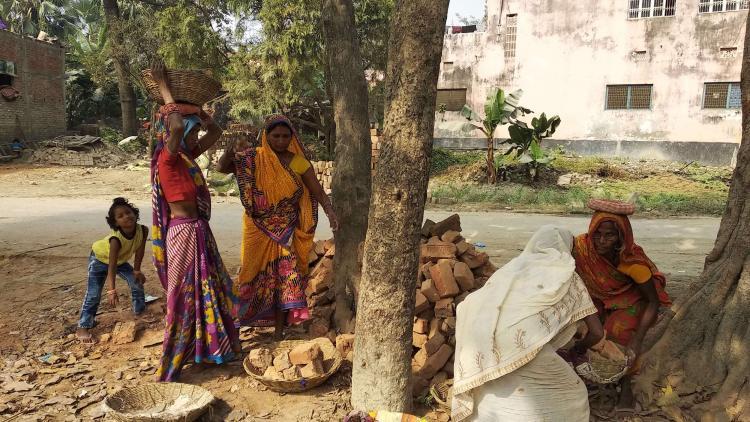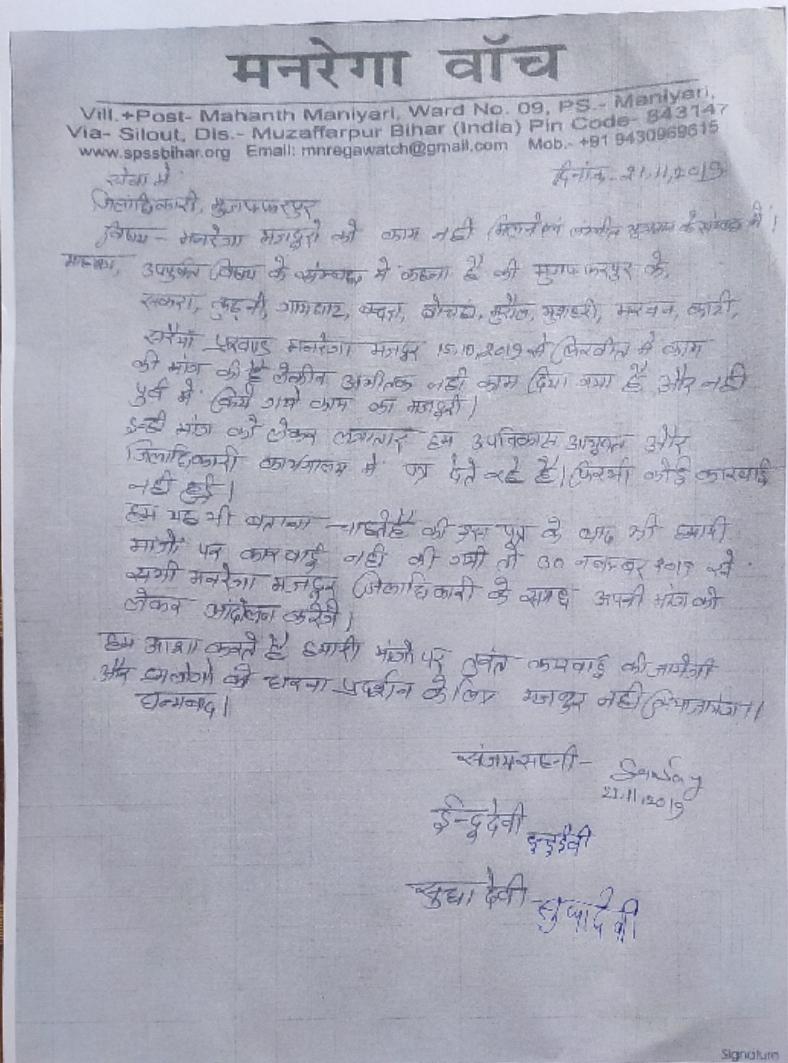Bihar’s MGNREGA Workers Stare at Deeper Rural Stagnation

Jageshwari Devi, MGNREGA worker, Mahant Maniyari village, Kurhani block Muzaffarpur district.
After a gap of months, Mahatma Gandhi National Rural Employment Guarantee Scheme (MGNREGS) workers in ward no. 7 of Ratnauli panchayat in Mahant Maniyari village under Kurhani block of Muzaffarpur district are back on 100-day work. But many of them are still awaiting their past wages.
Jageshwari Devi, 58, a resident of the village, while lifting bricks on her head, said: “We are working under MGNREGA with the hope of getting payment sooner or later. Since five months, we have been waiting for our wages, but there are just assurances, no relief.”
According to Sanjay Sahni, convener of non-political organisation, NREGA Watch, the reason for the gap in work is non-payment of wages, which is to be done by the district administration and government.
Sahni told NewsClick that there were three categories of workers who are awaiting their wage in terms of time interval. For a few of them, wages of three to six months are pending, but many of them are still desperate about getting their annually awaited wages.
The mandate of MGNREGA is to provide at least 100 days of guaranteed wage employment in a financial year to every rural household whose adult members volunteer to do unskilled manual work. Its core objectives include providing not less than 100 days of unskilled manual work as guaranteed employment in a financial year to every rural household as per demand, resulting in creation of productive assets of prescribed quality and durability and, most importantly, strengthening the livelihood resource base of the poor. But the rural job guarantee scheme’s story on ground remains opposite to its laid down principles.

MNREGA workers in Bihar continue to work without wages.
Acknowledging the prolonged wage crunch and equal work demand, NREGA Watch, along with workers of the Kurhani and adjoining blocks, is planning to stage a protest at the Muzaffarpur collectorate. The decision to protest came up in wake of workers of Sakra, Gaighat, Bandra, Kurhani, Marwan, Musahari, Maraul, Bochahan, Saraiyya and Kanti blocks not been paid since months. NREGA Watch sources said noted development economist, Jean Dreze, and co-founder of Mazdoor Kisan Shakti Sangathan, Nikhil Dey, will participate in the proposed protest.

Letter to DM Muzaffarpur by NREGA Watch on protest against non-payment
Last year, too, the MGNREGA workers had protested citing rampant corruption in the people’s scheme.
According to Section 3(3) of the MGNREGA, workers are entitled to payment on a weekly basis, and in any case within a fortnight of the date on which work was done. The National Rural Employment Guarantee Act, 2005, states that in case of a delay in payments, there is a provision for compensation to workers at the rate of 0.05% per day. However, this clause is not taken seriously by the administration and workers are hardly ever paid compensation for wage delay.
Despite such provisions in the Act, labourers have not been paid the meagre amount of Rs 171/day, which is the state-wise amount for unskilled manual workers, based on measurement of work done i.e. piece rate basis.
Anil Ram (right), a migrant labourer with NREGA Watch convener Sanjay Sahni.
Anil Ram, a migrant worker from village Mahant Maniyari, says if MGNREGA wages were a bit high, at least Rs 400/day, then people like him would not have to migrate to Vishakhapatnam in Andhra Pradesh.
“At least 100 of us have migrated to states like Assam, Gujarat, and sole reason remains extremely low wages of workers. How can we run a family of four on Rs 171/day?” he says.
But sometimes it is the other way around, he says. “When they do not find an economically favourable job outside Bihar, many youth, out of distress, decide to return and try their hands in 100 days of work”, he adds.
Anil Ram’s says the basic problem is lack of opportunities. For Bihar’s MGNREGA workers, it’s a choice between the devil and the deep sea. While low wages in Bihar compel them to migrate, lack of opportunities outside the state, pushes them back home to work for lower wages or even no wages for months.
Speaking with NewsClick over phone, Ashish Ranjan, secretary of National Alliance of People’s Movements (NAPM), Bihar chapter, said there was severe fund shortage under MGNREGA in the state. “Payment to MGNREGA workers has been stopped since six months,” says Ashish, who currently works with MGNREGA workers in Araria district of Bihar.
He accused the government of gimmickry to mislead MGNREGA workers when it comes to paying them for their labour, by announcing of wrong dates for release of funds. “This is how the government misleads workers on MIS (Management Information Systrem),” he adds.
The intentions of the Bihar government have been suspect since long in terms of raising MGNREGA wages, he says, adding that in 2015, it slashed the minimum wage to Rs 138 a day which, after efforts of social activists and a public interest litigation filed in Patna High Court, was finally rolled back.
The Bihar government has the power to strengthen livelihoods of MGNREGA workers under Section 32(1) of the Act, which states that the government may, by notification, make rules to carry out the provisions of Act subject to the conditions of consistency with MGNREGA and rules made by the Central government.
MGNREGA, which is a bottom-up, people-centric, demand-driven, self-selecting and rights-based programme that ensures employment specifically to rural population, seems to have been deliberately turned into a non-functional scheme to hurt the rural population.
In short, the cat fight and blame game of fund crunch between state and Central government is directly pushing rural workers deep into rural stagnation, which will further lead to an existential crisis of the worst kind sooner rather than later.
The writer in an independent researcher based in Bihar.
Get the latest reports & analysis with people's perspective on Protests, movements & deep analytical videos, discussions of the current affairs in your Telegram app. Subscribe to NewsClick's Telegram channel & get Real-Time updates on stories, as they get published on our website.
























